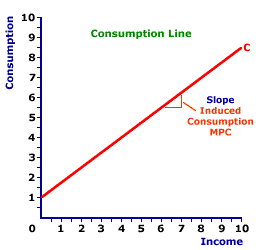
|
|
VOLUNTARY UNEMPLOYMENT: Unemployment that results when resources which are willing and able to engage in production choose not to produce output. These are resources (especially labor) that decide to leave one job, often in search of another. The contrast to voluntary unemployment is involuntary unemployment, in which resources are forced out of work.
Visit the GLOSS*arama
|
|


|

|
                           PSYCHOLOGICAL LAW: A principle of consumption behavior proposed by John Maynard Keynes stating that people have the propensity to spend a large fraction, but not all, of any additional income received. This psychological law is not so much a principle of psychology as an economic observation about consumption spending and is related to the notion of effective demand. The psychological law was proposed by John Maynard Keynes in The General Theory of Employment, Interest and Money, published in 1936, to capture the essential spending behavior of the household sector. It provides a key part of the consumption foundation upon which Keynesian economics is built.While Keynes used the term "psychology" to name this law, it is not really a law of psychology or of psychological behavior. Rather, it is a basic observation about consumption and consumer behavior. It postulates the likely relation between income, specifically changes in aggregate income for the economy, and consumption, specifically consumption expenditures by the household sector. Moreover, it is a law that applies to the aggregate economy more so than individuals. Individuals prone to violate this law from time to time, but the overall economy almost never does. Have More, Spend MoreThe psychological law indicates that the household sector is inclined to use additional income (such as what might be received when the economy expands) to purchase more goods and services. People have more income, so they buy more things. However, and this is an important however, the household sector does not spend all of the additional income. Part of this extra income is set aside as saving. Consider an example. Suppose that Duncan Thurly, a typical human being consumer, receives a $1,000 end-of-the-year holiday profit-sharing bonus from his employer. The psychological law indicates that he is likely to spend a large portion of this bonus, say $900, on something like a new computer. However, he then keeps the remaining portion, $100, unspent in his savings account. Alternatively, should Duncan have a drop income of $1,000 due to a period of involuntary unemployment, then he is likely to reduce his spending by only $900, also reducing saving by $100. The Consumption Line| Consumption Line |
|---|
 |
The psychological law is embodied in the consumption function (or consumption line), such as the one displayed in the exhibit to the right. The vertical axis measures consumption expenditures. The horizontal axis measures income generated from production.The red line, labeled C, is the consumption line. This line has a positive slope, indicating that greater levels of consumption expenditures result from greater levels of income. Moreover, the slope of the line is numerically less than one. That is, the change in consumption expenditures is less than the change in income. The relation between consumption and income is termed induced consumption and is measured by the marginal propensity to consume, which is the numerical measure of the slope of the consumption line. Effective DemandThis psychological law is most important for the Keynesian economic notion of effective demand. Effective demand indicates that aggregate expenditures, especially consumption expenditures, are based on the actual income generated by production and not on the income that would be generated if all resources were fully employed. Effective demand was proposed first by Thomas Malthus and later by Keynes as a counter to Say's law that supply creates its own demand. Effective demand, in contrast, suggests that demand creates its own supply (at least up to full employment). This might seem like a subtle, insignificant distinction, but it helps to separate classical economics and its assurance of full employment from Keynesian economics and the distinct possibility of persistent unemployment.

Recommended Citation:PSYCHOLOGICAL LAW, AmosWEB Encyclonomic WEB*pedia, http://www.AmosWEB.com, AmosWEB LLC, 2000-2025. [Accessed: July 22, 2025].
Check Out These Related Terms... | | | | | | | | |
Or For A Little Background... | | | | | | | | |
And For Further Study... | | | | | | | | | | | | | | | | |
Search Again?
Back to the WEB*pedia
|



|

|
GRAY SKITTERY
[What's This?]
Today, you are likely to spend a great deal of time waiting for visits from door-to-door solicitors wanting to buy either decorative picture frames or storage boxes for your income tax returns. Be on the lookout for broken fingernail clippers.
Your Complete Scope
This isn't me! What am I?
|

|
|
North Carolina supplied all the domestic gold coined for currency by the U.S. Mint in Philadelphia until 1828.
|

|
|
"You can't build a reputation on what you are going to do." -- Henry Ford, automaker
|

|
JLEO
Journal of Law, Economics and Organization
|

|
|
Tell us what you think about AmosWEB. Like what you see? Have suggestions for improvements? Let us know. Click the User Feedback link.
User Feedback
|


|


